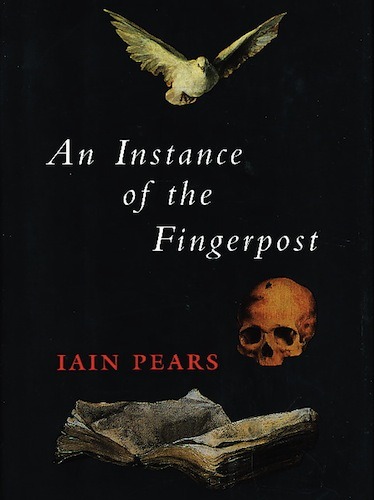Meanwhile, Bramanti went on: “Sublime Hierogam of the Chemical Wedding, Sublime Rodostauric Psychopomp, Sublime Referendarium of the Most Arcane Arcana, Sublime Steganograph of the Hieroglyphic Monad, Sublime Astral Connector Utriusque Cosmi, Sublime Keeper of the Tomb of Rosencreutz… Imponderable Archon of the Currents, Imponderable Archon of the Hollow Earth, Imponderable Archon of the Mystic Pole, Imponderable Archon of the Labyrinths, Imponderable Archon of the Pendulum of Pendula…” Bramanti paused, and it seemed to me that he uttered the last formula with reluctance: “And the Imponderable Archon of Imponderable Archons, the Servant of Servants, Most Humble Secretary of the Egyptian Oedipus, Lowest Messenger of the Masters of the World and Porter of Agarttha, Last Thurifer of the Pendulum, Claude-Louis, Comte de Saint-Germain, Prince Rackoczi, Comte de Saint-Martin, and Marchese di Aglie, Monsieur de Surmont, Mr. Welldone, Marchese di Monferrato, of Aymar, and of Belmar, Count Sol-tikoff, Knight Schoening, Count of Tzarogy!”
An Instance of the Fingerpost (Iain Pears, 1997)
The full-immersion historical novel isn’t an easy one to get right. It’s easy to get bogged down in irrelevant contemporary details, info-dumps in the form of history lessons, or archaic speech. Or it can be a failure of overarching style, as novels written in the 18th and 19th centuries in particular (popular periods for period books) are for the most part extremely well-structured, a feat not every novelist can achieve. An Instance of the Fingerpost manages to avoid most of these pitfalls, presenting a vibrant and highly compelling 17th century England, but outside the traditional bustle and filth of London. The structure of the book is also compelling, and as soon as you detect it, the depth and your own interest increases.
If anyone can achieve power, then all will try and government becomes a mere battle in which principle is sacrificed for interest. The lowest will impose themselves, for the best will shun the gutter.
Do Make Say Think – “In Mind”
You, You’re A History In Rust
The last track from a solid album that demonstrates the musical breadth of which Do Make Say Think are capable. Most of the post-rock motifs have been stripped out, or at least aren’t front and center. There’s more songwriting and less atmospherics — not a change many fans expected, I think (when I saw them live, they admitted they would sing on their next album as if it was a crime), but after three or four excellent albums along their original line of musical thinking, a little variety can’t hurt (and at any rate, their next album was a return to form). This final track is a good distillation of the album, which is well worth a listen and may in fact be the best starting point for new listeners. (insound)
When Sir Philip Sidney was making the grand tour, three centuries ago, he came to Vienna, where he studied horsemanship with Pagliano, who, says Sir Philip, in praise of the horse, became such a poet “that, if I had not been a piece of a logician before I came to him, he would have persuaded me to wish myself a horse.”
O love, they die in yon rich sky,
They faint on hill or field or river.
Our echoes roll from soul to soul,
And grow forever and forever.
Bibio – “Mr. & Mrs. Compost”
Vignetting The Compost
Despite the fragrant name, this track and to a great degree this album are surprisingly tender and beautiful. Bibio has since diversified, but within his purview at the time, this was expansive, playful, melancholy, and absolutely unique in sound.






